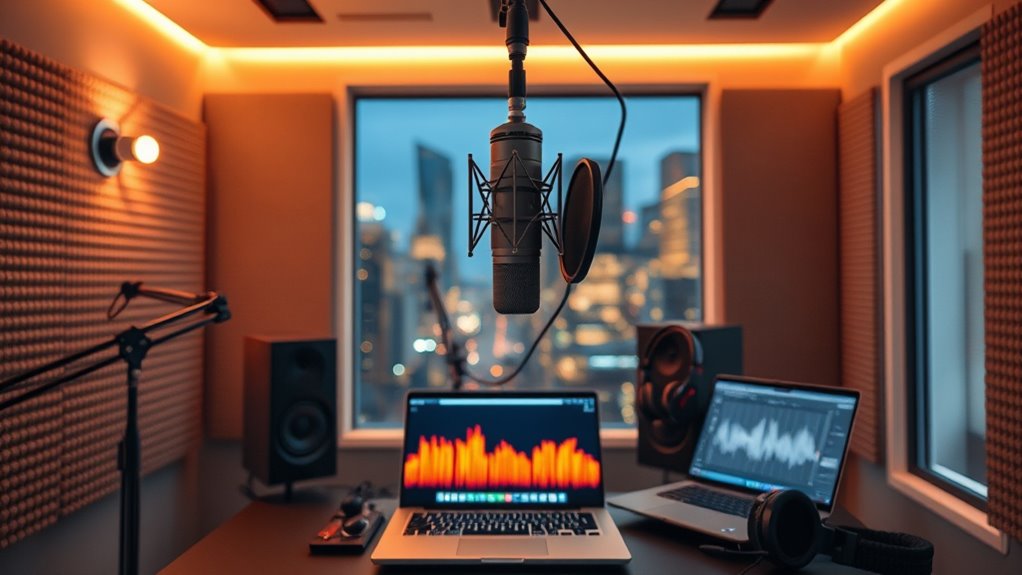Podcasting has rapidly grown from a niche hobby to a major mainstream media platform, transforming how audiences consume content and how creators make money. With low barriers to entry, anyone can start a podcast and reach a global audience. Innovative monetization options like sponsorships, crowdfunding, and premium content help sustain growth. Engaged audiences boost sharing and participation, making podcasting a viable career choice. To discover more about this exciting evolution, keep exploring how podcasting continues to shape media today.
Key Takeaways
- Podcasting transitioned from a niche hobby to a mainstream media platform through innovative monetization and audience engagement strategies.
- Low barriers to entry democratized content creation, enabling diverse voices and independent producers to reach global audiences.
- Effective audience engagement through feedback, social media, and live events fostered loyalty and community building.
- Multiple monetization methods, including sponsorships, crowdfunding, and premium content, support sustainable growth for creators.
- The evolving media landscape and engaged audiences present significant future growth opportunities for podcasting.

Have you noticed how podcasting has transformed from a niche hobby into a dominant force in mainstream media? This shift didn’t happen overnight. It’s the result of innovative monetization strategies and a deep focus on audience engagement that keeps listeners coming back for more. Today, podcast creators can monetize their content in ways that weren’t possible just a decade ago, including sponsorships, crowdfunding, premium content, and ad placements. These strategies have opened up new revenue streams, making podcasting not just a passion project but a viable career option for many.
Podcasting has become a mainstream media force through innovative monetization and audience engagement strategies.
One of the key reasons podcasting has gained mainstream traction is how accessible it is. You don’t need a broadcasting license or a large studio to start your own show. All you need is a microphone, some editing software, and a hosting platform. This democratization of media allows anyone with a compelling idea to reach a global audience. As you build your podcast, audience engagement becomes essential. Listening to your audience’s feedback, responding to comments, and encouraging interaction through social media or live events helps foster a loyal community. When listeners feel connected to the host and the content, they’re more likely to share your podcast and support it financially.
Effective monetization strategies often hinge on understanding your audience’s preferences. For example, integrating sponsorships that align with your listeners’ interests makes advertisements feel more natural and less intrusive. Crowdfunding platforms like Patreon allow your audience to directly support your work in exchange for exclusive content or perks, strengthening the bond between you and your supporters. Additionally, offering premium episodes or ad-free versions can generate extra income while providing value to your most dedicated fans. Recognizing the importance of monetization options, creators can diversify their income streams and build sustainable careers.
Audience engagement also plays a significant role in attracting new listeners. Engaged audiences tend to share episodes, leave reviews, and participate in discussions, which organically boosts your reach. You can leverage this by creating interactive content—Q&A sessions, listener polls, or guest appearances—that invites participation. When your listeners feel seen and heard, they become ambassadors for your show, helping it grow in popularity and influence.
In essence, the rise of podcasting owes much to strategic monetization and active audience engagement. These elements create a sustainable ecosystem where creators can thrive financially while maintaining a strong, loyal listener base. As you develop your podcast, focus on understanding your audience’s needs and preferences. With the right strategies, you can turn your podcast from a simple idea into a powerful platform that resonates widely and generates income. The future of podcasting is bright for those who prioritize connection and adaptability in this rapidly evolving media landscape.
Frequently Asked Questions
How Do Independent Podcasters Monetize Their Content Effectively?
You can monetize your content effectively by leveraging sponsorship strategies that align with your niche and audience interests. Reach out to brands for partnerships or use platforms that connect podcasters with sponsors. Additionally, explore merchandise opportunities like branded products or exclusive content to boost income. Engaging your listeners with these monetization methods helps grow your podcast financially while maintaining authenticity and audience trust.
What Are the Technical Challenges Faced by New Podcast Creators?
You face technical challenges like ensuring good audio quality, which requires proper equipment and editing skills. Choosing reliable hosting platforms is also essential, as they impact your podcast’s accessibility and distribution. You might struggle with file formats, storage limits, or platform compatibility. To succeed, invest in quality microphones, learn basic editing, and select a hosting service that fits your needs, making your content clearer and easier for listeners to find.
How Does Podcasting Influence Traditional Media Industries?
You see, podcasting shakes up traditional media by changing audience demographics and advertising strategies. As you tune into niche topics and diverse voices, mainstream outlets feel the heat to adapt, innovate, and capture new listeners. This shift pushes traditional media to rethink their content and marketing approaches, making the industry more dynamic. You’re part of this wave, shaping how stories are told and how audiences engage with media today.
What Are the Copyright Issues Unique to Podcasting?
You need to be aware that podcasting faces unique copyright issues, especially around music licensing and fair use. When including music, you must secure proper licenses or risk legal trouble. Fair use might cover some snippets, but it’s risky without clear boundaries. Always verify permissions and consider copyright laws carefully so you avoid infringement, protect your content, and respect creators’ rights.
How Can Podcasts Improve Audience Engagement and Retention?
To improve audience engagement and retention, you should focus on increasing listener interaction through Q&A sessions, polls, and social media engagement. Personalize your content by tailoring episodes to your audience’s interests and feedback, making them feel valued. Use storytelling and consistent posting schedules to build loyalty. When listeners feel involved and see relevant content, they’re more likely to stay tuned and become long-term followers.
Conclusion
As podcasting continues to grow, you see its influence expand, its voices amplify, and its reach deepen. You witness creators shaping conversations, audiences engaging more passionately, and industries transforming their strategies. Podcasting isn’t just a trend; it’s a movement. It’s a platform for expression, a tool for connection, and a bridge to understanding. Embrace this evolution, participate in this revolution, and realize that podcasting’s rise isn’t just happening around you—it’s happening because of you.








